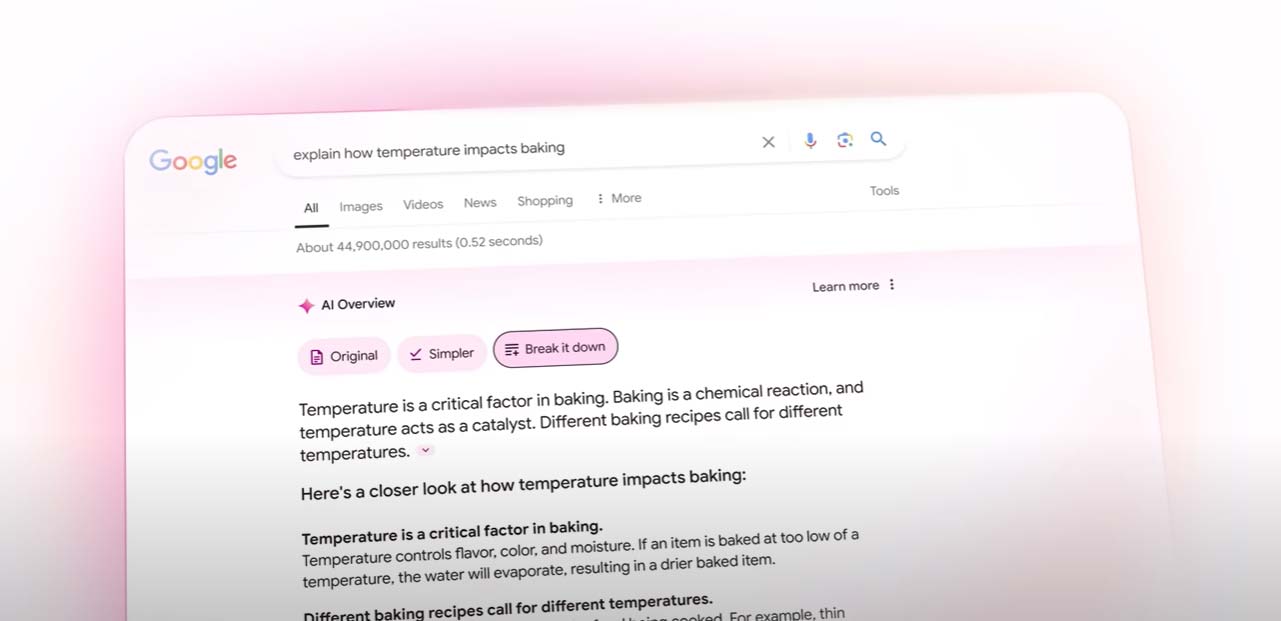Google search results with AI: News! Gemini is coming – Will SEOs & agencies soon be out of a job?
OMG! The time has come! You’ll soon get Google search results with AI from Google’s Gemini. This morning, this video washed into my timeline, published by Google, tonight, breaking news. With Google’s decision to put artificial intelligence at the top of search results, e-commerce is facing a crucial challenge. Online stores must prepare for a new reality where users’ needs are interpreted and fulfilled by intelligent algorithms – no longer “just” by SEOs(search engine optimization). How will online marketing strategies change to succeed in this new era of digital commerce? Will SEOs soon be out of a job? + Int
erview with Alphabet CEO Sundar Pichai, exclusively for CNBC at the end of the news.
After 27 years: The new Google search mask
27 years ago, in 1997, Google revolutionized the Internet with the introduction of its groundbreaking search algorithm. Since then, the company has become an integral part of everyday digital life, helping millions of people find information quickly and efficiently.
I also fell in love with the 6 colorful letters of the logo back then! I lived in Frankfurt for a short time back then. I still remember exactly when a school friend came up to me and said: Do you know Google?
Since then, 100+ websites built, 30+ online stores, 5+ apps and now?
Will SEOs soon be out of work?
Haha, don’t worry, Google still has to earn money in the end, but yes, long-tail keywords and simple content such as “dating sayings” or “children are bored” will no longer lead directly to e-commerce. The result:
- Fewer clicks
- Less traffic
- Fewer leads
The arrival of ChatGPT: AI in everyday life
About two years ago, ChatGPT burst onto the scene, bringing artificial intelligence into people’s everyday lives as a practical tool. This AI-based technology enabled users to use natural language to interact with computers, solve complex problems and obtain information without having to search for it for a long time.
How long will Google wait until AI replaces traditional search?
Tonight, the answer came on YouTube.
Watch this video! From Google
The video changed all my plans this morning
In a late night revelation, a video was released explaining the upcoming changes in detail. This video provides an insight into Google’s strategy to improve search results while taking into account the needs of users and advertisers.
When will Google bring AI to search results?
The question of whether Google would change its search results has long been debated. As the main source of advertising revenue resulting from top rankings in search results and Google Shopping, the company was faced with the challenge of improving its user experience without jeopardizing its revenue.
- Google earns money with advertising placement
- AI will soon appear before the search results
- Will there be internal links in the AI text?
- Will shopping remain the last e-commerce lead source?
Rollout of the changes: OMG! The time has come
After a long wait, the time has finally come. Google announced that changes to the search results will be introduced in a few weeks. The rollout will first take place in the USA, followed by a rollout in Europe.
- Rollout in the USA: in the coming weeks
- Europe: A few weeks after US rollout
Google’s announcement has triggered mixed reactions. While some welcome the changes and are pinning their hopes on an improved search experience, others have expressed concerns about the potential impact on their business models.
The coming weeks will show how these changes will affect the Internet landscape. I am excited!
Breaking News! Alphabet CEO Sundar Pichai
Alphabet CEO Sundar Pichai speaks exclusively to CNBC.
Learn SEO: old school?
You still want to teach yourself SEO skills? Maybe not a bad idea, because people still want to store! People still need craftsmen, people are still looking for decorating ideas and coaching. And yes, Google still has to earn money with advertising placements (Google Ads).

 4.9 / 5.0
4.9 / 5.0